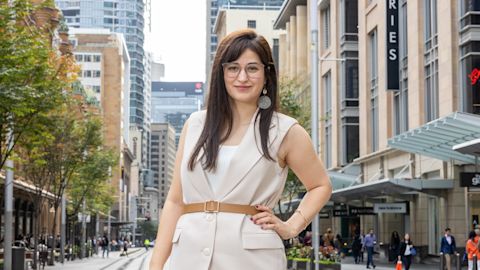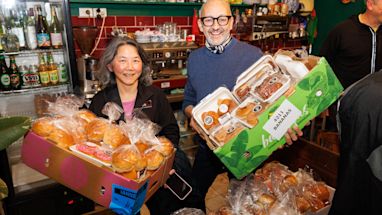Samah Shda is a storyteller, researcher and founder of Unbound Stories, a social enterprise exploring ethical community-led approaches to storytelling in migration and displacement contexts. She is a speaker at Refugee Week.
When I first arrived in Australia, people did not know what to do with my story.
It was too complicated. I was an Assyrian woman from Iraq, displaced by war, yet also educated, multilingual and determined to shape a life beyond displacement. Still, the stories people wanted were clear: one of suffering or one of success. Nothing in between.
I wrestled with this dichotomy for years. At conferences, listeners leaned in when I described hardship, yet blinked blankly when I spoke about my research and the reality of building a new home filled with contradictions and community.
The first time I told my story my voice shook while I recalled high school and the aftermath of war in Baghdad. I could not breathe. Several audience members comforted me, assuming I was reliving trauma. The truth was simpler. I had never spoken to more than 40 people. I was just nervous about public speaking.
Since then, I have addressed hundreds. A TEDx coach taught me ways to calm performance anxiety. But looking back, that audience reaction, and many like it since, became quiet cues to shape my story into something that fit their assumptions.
For many who seek refuge, storytelling begins as survival.
For many who seek refuge, storytelling begins as survival. To gain protection you must narrate your suffering to a case officer who decides if it is legitimate. Later you are invited to become an inspirational example. In both moments the narrative is moulded by what makes others comfortable.
This pressure erodes dignity. As Dina Nayeri notes in The Ungrateful Refugee, it flattens lives into something palatable for an audience when what people need is space simply to be who they are. It reinforces narratives that dehumanise refugees.
As a storyteller, I believe we need a model grounded in antifragility, a term coined by Nassim Nicholas Taleb, to describe how growth can emerge from pressure and uncertainty. If resilience is like a spring that bounces back, antifragility is like a muscle that gets stronger through stress. I saw this through research with refugee students in Uganda and in my work with UNHCR. They didn’t just recover from displacement, they developed new skills like social intelligence, navigating bias and strategic thinking. This is what lived expertise means as a refugee: not just surviving, but adapting and leading in complex, often overlooked ways.
I founded Unbound Stories because I could not bear that narrow script anymore. The ideas I’ve shared in this article form the basis of our social impact startup. We work with refugee and migrant communities to co-create stories rooted in dignity, complexity, and self-determination. Our goal is simple: returning story sovereignty to those too often spoken for.
Speaking at events such as Refugee Week, I have learned that complexity is powerful. Sometimes stories make people laugh. Sometimes they leave people unsettled. Discomfort is not failure: it is feedback. This is what antifragility asks us to do. Learn and grow from discomfort.

Here are some ways to listen more thoughtfully to refugee and migrant stories.
Be curious and critical
Ask why events happened and which systems shaped them.
Embrace complexity
There can be contradictions in the stories you hear. Many of us are still in the middle of the journey.
Avoid assumptions
Don’t search for pain or heroism. Look for the person.
Engage
Ask, What do you wish people understood about your life now?
Stay with discomfort
Pause when you shift in your seat.
Sydney is home to many layered cultural identities, a richness celebrated during Refugee Week. If we only share stories that are easy to digest, we miss the real work of inclusion.
Hear from Samah and other Refugee Council of Australia ambassadors during Refugee Week, 15 to 21 June.
Published 4 June 2025



